#i play 3 different ttrpgs every week
Explore tagged Tumblr posts
Text
But as the article notes, the fact that D&D's playerbase is growing increasingly progressive and roleplay-focused is not something supported by the actual 5E ruleset (or even the 3.5 ruleset if I'm honest.) "Stapled on by the DM" is the reality of the situation. If you want a game that helps you make good story happen, play a different game.
#i play 3 different ttrpgs every week#one of them is pathfinder#guess which one I'm perpetually paying the least attention to#like. do i think pathfinder is better than 5E at what it does? yes#but do i especially like what either of them are trying to do? no#and i think most people who are in that progressive roleplay-forward group also don't actually want what pathfinder & d&d are trying to do#5E is easier than pathfinder because it's worse at being a combat simulator than pathfinder#but it's still fundamentally a combat simulator with social skill checks stapled to the side#plaaaaay a diiiiifferent gaaaame#(we have one guy in our pathfinder group who cannot be convinced to try longform campaigns if they aren't d&d clones)#(meanwhile everyone else is getting kinda burnt out on it)#(it's an issue)#dice & drama#gaming#dove.txt
625 notes
·
View notes
Text
Hi folks, it’s Mint.
I’m on a mini-vacation this week so I’m going to be releasing some recommendation posts for things that aren’t related to requests (easy to queue), and I’ll be back to doing regular rec posts when I get back!
THEME: TTRPGs For Palestine.
This is going to be a list of recommendations of games that you can get in the TTRPGs for Palestine Bundle. There’s plenty of games in the bundle that I’ve recommended before, so I’m going to try and focus on games I haven’t talked much about before. You can look at the bottom of this post for some of the greatest hits!
The bundle is on until June 29, so make sure to pick it up before it's too late!







LORDSWORN, by Mareensmusings.
You rode to war at the call of your God, swore yourself to Their divinity as the drums of war beat from every corner of the Pantheon. Standing beside your divinity, Their purpose so clear and noble, you felt immortal. Beside your fellow Lordsworns, you felt your victory a certainty, battle but a trivial formality.
Now They lay dead before you, Their Godblood flowing into the dirt. Already the world lurches in distress, twisting at the loss of a God, one of many to die this day. Your Captain, too, lies broken, entrusting the survivors of your Company to the you. Of the thousands who rode out, you are all that remains of your Company.
Your God is dead. You only have each other now.
LORDSWORN is a GMless TTRPG for 1-4 players of tragic, fragile stories of desperate survival and comradery at the end of the world. In LORDSWORN each player takes on the role of three soldiers who swore themselves to a (now dead) God during the Cataclysm, an apocalyptical battle that saw all the Gods of the Pantheon go to war. With their God dead and the world churning and reeling from the death of the Pantheon, you and a handful of survivors must make the trek back to the only place that makes sense anymore – Home.
LORDSWORN is a collaborative game that guides your group into the story of a company, of which each player will control 3 Lordsworns. Your characters can be chosen from a list, or drawn randomly using a deck of cards. You navigate the game over four stages: world-building, company creation, the journey home, and the epilogue. The game is designed to be tragic, even if your company makes it all the way home. The core rules are built off of Caltrop Core, which means that you will rely mostly on d4s anytime you have to roll dice, but unlike many other Caltrop Core games that I’ve seen, the system is less focused on chance and more focused on oracles. If you want a game of tragedy that focuses on the story rather than the characters, you might want to check out Lordsworn.
Lamplighter’s Festival, by ira prince.
The lamps have been there for as long as we can remember. The lamps have never been there, and only appear for tonight. The lamps are strange and new — we’re still getting used to them, making space for them in our lives. We know exactly what the lamps mean, and we’ve committed their history to heart. We’ve forgotten what the lamps mean, even if the gravity of it still hums and shimmers around them. We’re deciding what the lamps mean, weaving their purpose in more tightly every year, every season, every eclipse. Tonight, we light the lamps, and we tell our stories about them.
Lamplighter’s Festival is a map-drawing game about a nighttime festival, and the things it can illuminate about the place in which it’s celebrated. It can be played alone, or collaboratively if you like.
Lamplighter’s Festival uses the random placement of dice to draw out a location, at whatever scale you like. You use the pattern that ensues to create locations on the map called Lamp Locations, which you will elaborate on as you play. At the end of the game, you will have not only a festival, but details about the different elements that are required for it to happen properly, and possibly the cultural meanings behind the festival. If you want a game that helps you build a place and a culture around one specific event, this might be the game for you.
A Labyrinth Like Us, by z.w. garth.
The minotaur city of Ut sits in the center of an endless labyrinth. The labyrinth twists and turns, it folds and rearranges. And from its dark halls pour forth monsters, which tear and smash and destroy.
You are a minotaur in your district's Guard. You respond to the waves of beasts that wreck havoc and mayhem—repelling the danger and protecting the afflicted. You carry with you your hopes for Ut's future, and your fears for its present. Rally with your neighbors to protect one another. Carve a home in the labyrinth.
A Labyrinth Like Us is a 2-page roleplaying game in the OSR/sword dream tradition. It requires 3-5 players, including one Keeper, 2d20 and 2d6, and these rules.
This game is reminiscent of, but not a direct replication of any specific myth. You play as minotaurs in a labyrinthine city, plagued by horrors that they can only face when working together. Your minotaurs use emotions to empower special abilities, which are mainly combat-focused.
The game is only two pages, with one page introducing you to the setting, character creation, and how to play, while the other provides roll tables and advice for the Games Master in order to make the labyrinth feel dangerous and dark. If you want a game that presents you with a challenge but doesn’t overwhelm you with rules, you might want to take a look at A Labyrinth Like Us.
HYPERMALL: Unlimited Violence, by Rat Bastard Games.
Do you hate your boss? Like, REALLY hate your boss?
HYPERMALL: UNLIMITED VIOLENCE is a mission-based corpo murder TTRPG about assassinating the rich and famous. Enter the consumerist hellscape of THE HYPERMALL where death is cheap and life is cheaper. HM:UV is an unhinged gonzo meatpunk sci-fi dystopia buzzword game for financial geniuses.
You're a CONTRACTOR for SLAUGHTR™ - The Assassination App - and your job is to Murder Your Target Without Dying. You're already in debt. You can't afford unnecessary Resurrections when rent is due, and you absolutely do not have health insurance. GET TO WORK.
Become a mutated killing machine, a psychic murderer, or a cold blooded cyber criminal. Try your best to make ends meet. Die a lot. Kill cops. Get paid.
This is a game of cathartic violence, with random roll tables to help you build a unique character quickly, pulling from d66 backgrounds and meshing together rules from games like Troika and PbtA. Combat isn’t just physical in this game: you can also fight your opponents in the finacial and social spheres, allowing you to take down someone three different ways.
The really difficult part is figuring out how to kills someone permanently, since there’s a resurrection matrix inside the Hypermall that makes death kind of hard to stick. If you want to unleash your fury in increasingly creative ways, you might want to check out HYPERMALL: Unlimited Violence.
Heaven / Hell, by Joel Happyhill.
Hell, The Underworld, Hades, Yomi, no matter what you call it seems like everyone’s ended up here. No one has any memory of their life before, if such a thing even exists. But one thing rings true, none of you want to stick around.
Heaven / Hell, otherwise known as 2H, is a competitive 1 VS 1 tabletop game set in the underworld. It’s meant to recreate the systems and strategies created by traditional fighting video games, allowing you to mix and mach a number of recognizable fighting game archetypes and optional rules to play your dream fighter through the medium of pen and paper.
Heaven/Hell is more like a competitive board-game than it is a tabletop roleplaying game. Your characters will travel across a board as they do battle with each-other, with distance and positioning being crucial in developing a strategy.
One mechanic that seems to help emulate fighting games is the use of the Underdog Token, which is granted to your character whenever you take a Wound in a round of combat. This Token can be spent in the following round to reveal a new Technique or do something called Flash Parry for a second time. You use this ability to halt another player’s move in its tracks, culminating in a scene that you might see in a dramatic fight where two opponents are holding each-other off with their weapons, possibly snarling at each-other as their faces draw close.
If you want the tactical complexity of a board-game combined with the dramatic moments of high-action tv shows, you might want to check out Heaven / Hell.
Hexfall, by Titanomachy RPG.
Stratus Cay is a floating city in the Rift, a digital quantum dimension at the intersection of the smallest black hole in the multiverse and the concept of becoming. The city is made of countless islands, a hyperreal archipelago adrift in flashing interdimensional lights. An infinite smattering of lives, as varied and precious as the stars themselves.
You are a hyperpowered being who came into larger-than-life abilities because of a profound cataclysm. Heartbreak. Grief. The depths. Physical, emotional, multidimensional–something unlocked incredible power in you. People like you have many names across Stratus Cay, but the most common is “Diver,” a nickname derived from their affinity for falling through the Rift, either on dangerous jobs or just for fun.
Divers’ abilities run the gamut of even the wildest imaginations, and their extreme power and durability makes many of them reckless thrillseekers. The pay is too good and the thrills too extraordinary to turn down the opportunity to go on a dive.
Hexfall takes the tried-and-true method of hexcrawling and turns it on its side, by making your travel vertical; you’re diving from the edge of a floating island and falling into the Rift, retrieving artifacts, harvesting resources, and enjoying the thrills of free-fall. Hexfall has combat, puzzles, and mysteries for you to solve, but it also gives you space to roleplay and get to know each-other’s characters, using a token system for actions like helping out your fellow divers, and signifying when you want to role-play a narratively significant moment between you and another person.
What really stands out in this game though, is the character playbooks. Do you have wings made out of swords? Do you carry the blessing of a giant? Have you embraced the fungal form of decay and rebirth? All of these are possibilities within various playbooks of Hexfall. If you want a game about thrill-seeking and finding meaning in a world that, as fantastical as it is, still demands you work out why you want to live, you might want to try out Hexfall.
Abominations, by Elliot Davis.
They tried to tell you to stop playing God. You replied, “Who’s playing?” and spliced in another gene.
What is an Abomination?
A living amalgamation of various forms of flesh, machinery, and whatever you can stick it together with. Some slimy, some hairy, some are covered in eyes. Others are a knot of tongues and fingers. An Abomination is whatever you can imagine it to be, tossed in a blender and put back together.
ABOMINATIONS is a tactile, GM-less TTRPG for 2-6 players. Using a set of letter tiles and some 10-sided dice, you will create one-of-a-kind monsters of your own design. Then take them into the ring for a fight to the last scraps.
This is a game that feels kind of like a biological version of Robot Wars. Instead of constructing robots and pitting them against each-other, you’re creating monstrous mutating piles of flesh and throwing them in the ring. Your characters are to an extent, somewhat pre-defined: each player chooses a vowel, which represents something of your character’s personality, as well as the secret mutation only they have access to. You play using Scrabble tiles, with each letter granting access to specific mutations, from Guns for Arms, to X-Ray Vision, to a Zipper Down the Middle!
If you want a goofy game of slapstick and body horror, I recommend Abominations.
Greatest Hits
Wanderhome, by Possum Creek Games.
FIST, by Claymore.
Apocalypse Frame, by Binary Star Games.
Bump in the Dark, by Jex J Thomas.
218 notes
·
View notes
Text
THE BLOGGIES 2023: FINALISTS
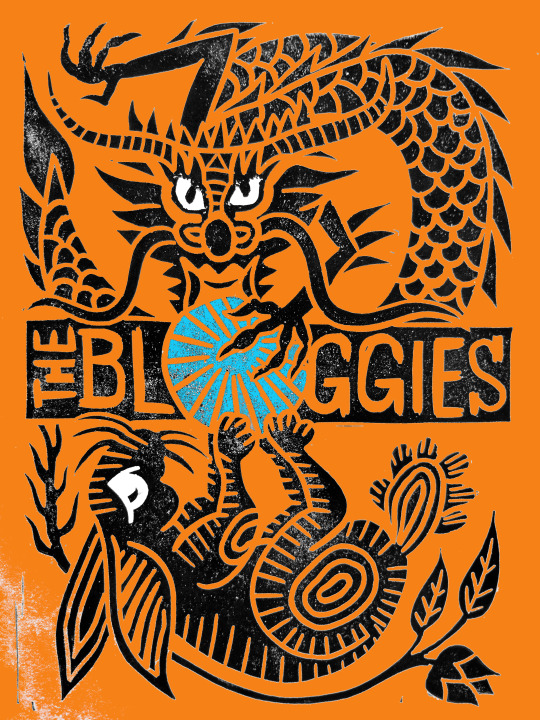
(If you just want to skip to the list of BLOGGIE finalists, scroll to the "Who Are The BLOGGIES?" section below.)
+++
WHAT ARE THE BLOGGIES?
Awards for some of the best tabletop roleplaying game (TTRPG) blog posts to come out in 2022. There will be five awards: Best Theory Blogpost, Best Gameable Blogpost, Best Advice Blogpost, Best Review Blogpost, and, the biggest one, Best Blogpost.
I won Best Blogpost, last year. So I am hosting the BLOGGIES, this year.
+++
WHY ARE THE BLOGGIES?
Blogs are worth celebrating. Barring the actual playing of actual games, they are our most fertile field, our most volatile laboratory. Longform, text-based, and informal---they are a place to jot down our most outre design ideas. Free and publicly available---they are a vector for open debate and serendipitous discourse. Perhaps most importantly: relatively free of algorithmic social-media pressures---they are the best chance we have at a cultural memory.
I got into TTRPGs because of blogs.
The BLOGGIES are, at best, an affirmation of the above. At least, they are a way to celebrate 64 excellent blog posts from the last year, and maybe get them in front of people who did not read them the first time.
+++
HOW ARE THE BLOGGIES?
Nominations: I put an open call for blog-post nominations on Christmas 2023; I also canvassed the TTRPG communities I am part of. Nominated posts had to be from between 1 December 2022 to 31 December 2023.
I closed the nomination period on 1 Jan 2024 with 149 blog posts for consideration. I read / re-read them all.
I chose a slate of 64 finalists, according to the following metrics, in order:
Enthusiasm---a post got multiple nominations;
Diversity---no one blog was allowed to be a finalist more than once in a category (except the Reviews category, where this rule was tied to individual writers, due to shared review blogs);
Notability---a post was extraordinary in presenting a novel idea, addressing an important subject, or reflecting a community current.
Obviously, that last metric is highly subjective, and limited to my knowledge and perspective in the scene. I did my best.
I will not have final final say. Finalists will go head to head, vying for to be anointed best of the best by ballot. The bracket was seeded in order of number of nominations received. The BLOGGIES await your vote, o TTRPG folx.
+++
WHEN ARE THE BLOGGIES?
Throughout January 2024! Voting is >>>NOW OPEN<<< on Google Forms according to the following schedule (I will link to the forms and result threads as I post them):
First Week January - THEORY
3 January: Round of 16
4 January: Round of 8
5 January: Round of 4
6 January: Quarterfinals (winners in category) - Results
Second Week January - GAMEABLE
10 January: Round of 16
11 January: Round of 8
12 January: Round of 4
13 January: Quarterfinals (winners in category) - Results
Third Week January - ADVICE
17 January: Round of 16
18 January: Round of 8
19 January: Round of 4
20 January: Quarterfinals (winners in category) - Results
Fourth Week January - REVIEW
24 January: Round of 16
25 January: Round of 8
26 January: Round of 4
27 January: Quarterfinals (winners in category) - Results
31 January - FINALS
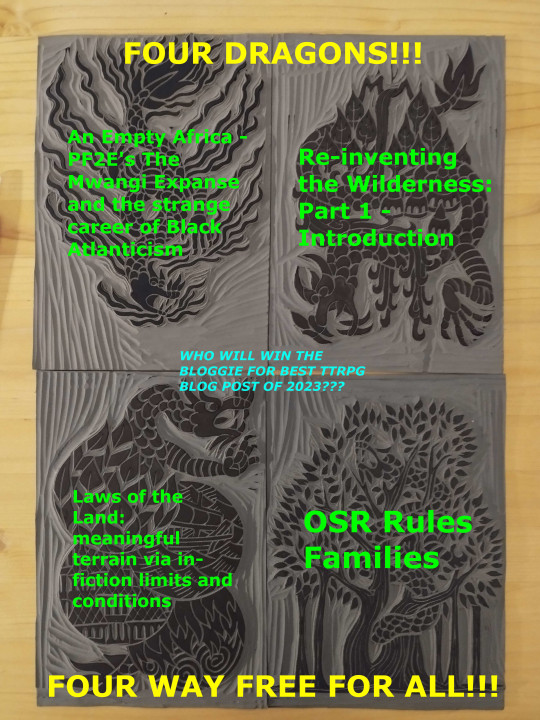
+++
WHO ARE THE BLOGGIES?
Your BLOGGIES 2023 FINALISTS are (presented in bracket order):
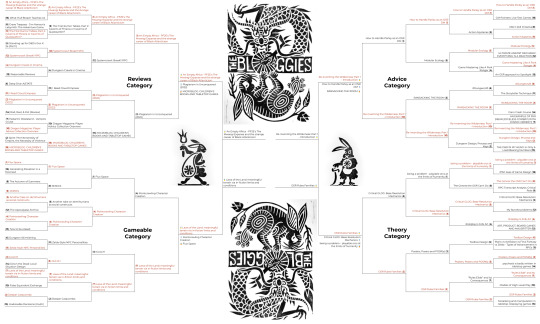
(High-res version here)
+++
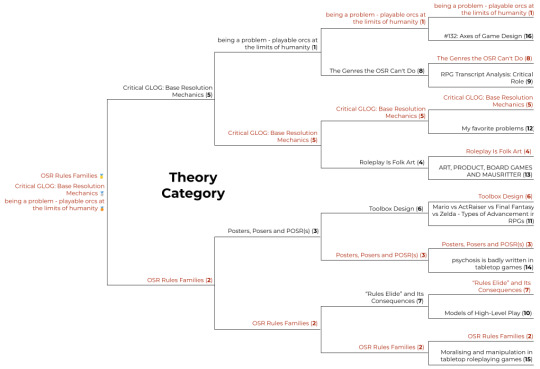
THEORY
🥉 (1) being a problem - playable orcs at the limits of humanity, from Majestic Fly Whisk Some deep thinking about the racialisation of the orc in elfgames, why mainstream fixes fall short, and ways to move beyond.
vs
(16) #132: Axes of Game Design, from The Indie RPG Newsletter An exploration of the design axes / spectrums on which every TTRPG may fall.
(8) The Genres the OSR Can't Do, from A Knight At The Opera Sketching the limits of the OSR playstyle by looking at genres which are too differently-bound for it to emulate.
vs
(9) RPG Transcript Analysis: Critical Role, from Trilemma Adventures Examining a style of play through transcript analysis (looking at what is actually being said during a session), with Critical Role as case study.
🥈 (5) Critical GLOG: Base Resolution Mechanics, from Goblin Punch A deep dive into dice and resolution mechanics, and what they do in practice.
vs
(12) My favorite problems, from Failure Tolerated A list of design problems in TTRPGs, and a case for game design and theory to be driven by problem-solving.
(4) Roleplay Is Folk Art, from Wizard Thief Fighter An impassioned call to consider TTRPGs as folk art as opposed to corpocratic walled-garden IPs.
vs
(13) ART, PRODUCT, BOARD GAMES AND MAUSRITTER, from Fail Forward Critique of reviews that accuse TTRPGs for being too slick; interrogating the assumptions behind the label “commercial”.
(6) Toolbox Design, from The Dododecahedron Considering the principles of designing TTRPGs like toolboxes, through the lens of Cairn RPG and similar.
vs
(11) Mario vs ActRaiser vs Final Fantasy vs Zelda - Types of Advancement in RPGs, from Rise Up Comus Identifying some general types of advancement in TTRPGs, using videogames as a comparative lens.
(3) Posters, Posers and POSR(s), from Prismatic Wasteland Relitigating whether the OSR is dead, and defining its successor, the Post-OSR.
vs
(14) psychosis is badly written in tabletop games, from paper cult “Attempting to mechanize something so intensely personal, different, and mutable as mental illness is complicated. I think that makes these depictions bad!”
(7) “Rules Elide” and Its Consequences, from Jared Considering the implications of the maxim that "a game is about X when you have rules for everything but X".
vs
(10) Models of High-Level Play, from Benign Brown Beast Loose but useful classifications for types of high-level play: domains; god-like play; etc.
🥇 (2) OSR Rules Families, from Traverse Fantasy Sketching the landscape of the OSR, how various systems function, and how their attributes cluster and trend together.
vs
(15) Moralising and manipulation in tabletop roleplaying games, from Playful Void The importance of having design preferences without tying these preferences to moral judgments.
+++

GAMEABLE
🥉 (1) Flux Space, from Papers & Pencils A point-crawl procedure specifically designed for labyrinths / dungeons that are architecturally confusing / samey.
vs
(16) Generating Elevation in a Hexcrawl, from Traveler's Rest Procedures and advice on how to generate a mountain-crawl: hiking-focused adventure geography.
(8) The Autumn of Summers, from False Machine God-monsters born of summer, the hunting culture around such beasts, and random tables to generate their attributes.
vs
(9) MIMICS, from Vaults Of Vaarn A spread of novel pretender-creatures, with ecological and social implications.
(5) Another take on demihumans as social constructs, from Cavegirl's Game Stuff What if we consider fantasy races not as separate species, but as differing social roles?
vs
(12) The Apocalypse Archive, from Bearded Devil An unfinished by exemplary #dungeon23 attempt that includes wonderful maps and soundtrack notes.
🥈 (4) Pointcrawling Character Creation, from Rise Up Comus A framework for tying character generation to a geography, generating history and familiarity with campaign locales.
vs
(13) how to be erased, from Straits Of Anian Procedures for getting lost and getting led astray, and the kith and spirits one meets in those places.
(6) Dungeon Skirmishing, from All Dead Generations Feature-complete skirmish combat mechanics for OD&D, and the design rationales thereof.
vs
(11) Zelda-Style NPC Personalities, from To Distant Lands A system of generating quick and punchy NPCs, inspired by the way Zelda videogames present NPCs.
(3) GULCH, from Mindstorm A starter town specifically designed for contemporary (horror, urban fantasy, non-fantasy) campaigns.
vs
(14) Down the Road: Local Situation Design, from Deeper In The Game A procedure for quickly generating a powderkeg situation in a local geography of play.
🥇 (7) Laws of the Land: meaningful terrain via in-fiction limits and conditions, from Was It Likely? A method to generate meaningful diegetic terrain and tone in an adventuring region.
vs
(10) False Equivalent Exchange, from The Graverobber's Guide A novel magic system, done in natural language, with discussion on how it could be used in play.
(2) Deeper Catacombs, from Benign Brown Beast Iteration notes and a presentation of a comprehensive dungeon tracking procedure.
vs
(15) Inadvisable Decisions (GLΔG), from The Nothic's Eye An evocative alienist character class, based on drawing the attention of alter-describable things from beyond.
+++

ADVICE
🥈 (1) How to Handle Parley as an OSR DM, from Goblin Punch Comprehensive notes on how to run non-combat encounters without resorting to boring rolls.
vs
(16) GM Pointers: Live-Text Games, from Shadow & Fae Good reminders on how to run live-text games better, so they are better coordinated and don't take forever.
(8) ONLY Roll Initiative, from Bastionland Considerations on how to adjudicate combats, if initiative were the only dice roll in a combat system.
vs
(9) Action Mysteries, from A Knight At The Opera Asserting that good TTRPGs mysteries involve action---not just figuring out the truth but opposing the antagonist's goals.
(5) Modular Ecology, from The Graverobber's Guide A practical approach to including gameable ecology in TTRPGs, by tying materials to specific locations and conditions of the world.
vs
(12) ULTIMATE ANIMIST MECHANIC: EVERYTHING IS A REACTION, from Alone In The Labyrinth How to run a game where all actions are resolved by reaction roll: everything in the world responds by how much they like you.
(4) Game Mastering Like A Park Ranger, from SILVERARM Advice about GM-ing, based on the real-world work experience of being a park ranger.
vs
(13) An OSR approach to Spotlight, from Permanent Cranial Damage The suggestion that intentionally spotlighting characters solves the real-life problem of spotlighting players nicely.
(6) #Dungeon23, from Win Conditions The idea that spawned a thousand notebook dungeons, plus salient advice on how to start / keep going.
vs
(11) The Storyteller Technique, from Possum Creek Games When writing TTRPGs, imagine your game text as a diegetic artefact in the world of the game.
🥉 (3) RANSACKING THE ROOM, from Mindstorm A simple and powerful three-step method to handle room-searching in games: inspect, search, and ransack.
vs
(14) Cairn Crash Course, from Widdershins Wanderings A masterclass example on how to write player guides to a game, for Cairn RPG.
(7) AN EXAMPLE OF FKR (NEAR-)DICELESS COMBAT (WITH COSMIC ORRERY!), from Underground Adventures Describing combat in a Free Kriegsspiel Roleplaying (FKR) game, useful in understanding that playstyle.
vs
🥇 (10) Re-inventing the Wilderness: Part 1 - Introduction, from sachagoat Figuring out problems with wilderness exploration, and applying a mental-map framework from urban-theory academia.
(2) Dungeon Design, Process and Keys, from All Dead Generations A detailed process to designing and keying a traditional dungeon adventure.
vs
(15) THE D&D IN MY HEAD: In Only 6 Load-Bearing Numbers, from I Cast Light! Identifying the essential and minimum rules you need to remember, to run D&D.
+++

REVIEW
🥇 (1) An Empty Africa - PF2E's The Mwangi Expanse and the strange career of Black Atlanticism, from Majestic Fly Whisk A review of Pathfinder’s "The Mwangi Expanse", and a discussion of Black Atlanticism's fraught relationship with its sourcelands.
vs
(16) What Hull Breach Teaches Us, from Mazirian's Garden An assessment of the Mothership RPG third-party "Hull Breach" anthology as a "new standard for anthology companions".
(8) Grave Trespass - Jim Henson's Labyrinth: The Adventure Game, from Bones Of Contention A review of the Labyrinth RPG. It’s got all these things which are "bad" in RPGs, so why does it work?
vs
(9) The First Rumor Tables, Part 2: Caverns of Thracia or Caverns of Quasqueton?, from Tom Van Winkle's Return To Gaming An investigation into the origins of rumour tables in TTRPGs. Did TSR plagiarise Jaquays?
(5) Standing up for D&D's Gen X: 2e (Part 1), from Mythlands Of Erce A full-throated defense of D&D2E, viewing it in the context of its time and as a refinement over 1E.
vs
(12) Systemcrawl: Break!! RPG, from Widdershins Wanderings A review and system analysis of Break!! RPG, which marries JRPG and OSR inspirations.
(4) Dungeon Crawls in Cinema, from Directsun Games Evaluating several films on the basis of how well they function as dungeon crawls.
vs
(13) Reasonable Reviews, from Rise Up Comus A general overview of TTRPG reviews, and what may or may not make them useful.
(6) Deep Dive: A|STATE, from The Indie Game Reading Club A review of a|state, and how it builds on and departs from the Blades In The Dark formula.
vs
(11) I Read Cloud Empress, from Playful Void A review of Cloud Empress, the first descendant of the Mothership RPG ruleset.
🥈 (3) Plagiarism in Unconquered (2022), from Traverse Fantasy A forensic analysis of how Unconquered plagiarised Ultraviolet Grasslands and Vaults Of Vaarn.
vs
(14) Rod, Reel, & Fist (Review), from Benign Brown Beast A substantial review of Rod, Reel, & Fist, a "system-forward fishing simulation RPG".
(7) Pedantic Wasteland - Vampire Cruise, from Bones Of Contention A review of Vampire Cruise, a largely system-neutral horror-comedy adventure set at sea.
vs
(10) Dragon Magazine: Player Advice Collection Overview, from Attronarch Athenaeum A comprehensive read-through and rating of 143 Dragon Magazine advice articles.
(2) Spire: The Monstrosity of Empire, the Necessity of Violence, from A A Voigt A comparative-literature analysis of Spire RPG through R F Kuang’s spec-fic novel "Babel, or the Necessity of Violence".
vs
🥉 (15) MICROBLOG: CHILDREN'S BOOKS AND TABLETOP GAMES, from Fail Forward Considering the influence of children’s books on TTRPG designers and works like "Barkeep on the Borderlands".
+++
It is difficult to describe how hard it was for me to whittle down the list of nominees to these finalists. I consider each of these 64 a landmark in 2023's TTRPG thinkings, and the folks from which they issue essential reading, going forward. They already deserve a prize.
So here it is, dear bloggers: a hand-carved linocut "finalist's pin" graphic you are free to use on your sites / posts, should you wish:
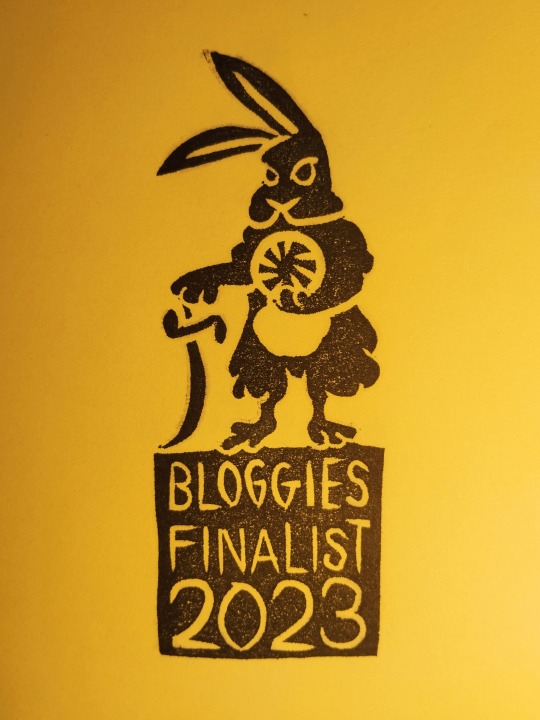
(High-res downloadable version HERE)
Thank you for writing! And good luck in the coming rounds of voting!
+++
CORRECTION: A blog post from 2021 (Not All Crunch Is the Same, from A Knight At The Opera), was included in the soft-launch posting of this list. An error on the part of its nominator, compounded by a data-entry error on my part. It has since been replaced by a post from the same blog with the actual most nominations (The Genres the OSR Can't Do). I have also double-checked my lists and all finalists. Apologies for my error!
182 notes
·
View notes
Text
Heyooo I’m looking for some people who would be willing to help me play test my ttrpg tales from the aether!
Tales from the Aether is a rules heavy sword and sorcery ttrpg heavily inspired by a number of open world video games. It focuses on role play and story telling while integrating both into the combat and social mechanics. Its roughly on par with pathfinder for crunchiness but takes a completely different approach to resource management in combat.
We’ll be creating characters and playing in a tournament esk arena to test out both the character creation and player combat system and to help me figure out the monster balancing.
Your commitments will be pretty low with reading the rules/character creation being the biggest time commitment and after that its all combat baby! I estimate - based on my own health and availability - that well be playing once every two ish weeks when everyone is available.
If this would interest you, please leave a comment or send me a message! If ur not interested for what ever reason then pls reblog and share so this post has more reach <3
(Edit: the server is temporarily closed due to so many volunteers XD if you are interested in joining, stick around for when I open the server again)
73 notes
·
View notes
Text
After eight sessions of Burning Wheel, we decided that it wasn’t clicking for our table. It had a bunch of neat tech baked in, but wielding the system was not a joy for us. It felt like we could either dedicate ourselves absolutely to the infinite Swiss watch design or else abstract down toward the core resolution forever without ever doing more than scratch the surface and in general neither of those felt…y’know, good. So we decided to drop it.
Which kind of sucks. I feel a little defeated by the book. Like, I spent a not inconsiderable amount of time plumbing through the obtuse and confusing self-referential and esoteric prose, trying to get to the heart of why so many of my favorite designers cite it as a seminal work in the TTRPG field, but all I got was the feeling that the inheritors of its ideas did a lot to clean them up, sharpen them, and make them infinitely more fun to engage with.
I’m left with a feeling I’m getting pretty used to. I missed that moment when this thing was “cool.” I missed the Forge, I missed G+, and I missed Burning Wheel.
But also, I’m given to understand the Forge, like Burning Wheel, had problems, so I’m not taking it too hard.
We decided to play Mausritter this Friday. In a complete 180 from the rule-heavy interlocking gears and levers of Burning Wheel, the 300 pages of character creation, we decided to roll 3d6 3 times, and then 1d6 twice and take our little adventurer mice into the great big world to face danger and find treasure.
I’ve been having a recent problem where I play games for the wrong reasons. I’m looking for inspiration, for pilferable game design thoughts, for experiences outside of my comfort zone. I’m running games as work, as research. I’m slavishly adherent to the rules as written because I feel as though I owe that to the designer, because they clearly knew what they were doing and were doing it for a purpose. It’s a mental weight.
So I am attacking Mausritter from an entirely different angle. It’s an OSR game, very light and fast and abstracted. The rules are loose and few. It’s very minimal mental overhead. So I don’t have a lot to worry about getting “wrong” in the way that I’ve been secretly fearing I’ve been doing for Burning Wheel these past eight weeks. I’m playing this one for fun.
I’ve told my table that I need them to keep me honest. This is not work. My Friday night table is often abused as a play test group, often treated as an extension of my job as a game designer. I design games so I must play them. But this one’s just for fun. Don’t let me think to hard about it. Because I’m not in a mental state to do that right now.
We’re going to be mice. It’s going to be fun.
Anyway. I’ve done a thing I haven’t done in forever and prepped for a game. I’ve got a cool hexmap (adorable), have created some factions out in the world (portentous), named some NPCs (wholesome), and home brewed up some interesting spells and items to sprinkle around (fun as hell). I have not sat and just played DM by myself in a while. Still not something I want to do every time, but a welcome break from conducting atop a surfboard in front of a disaster wave.
I’m excited about this game. Can’t wait to report back.
81 notes
·
View notes
Note
Do you have recs for similar horror/spooky vibes as your IF? I just played Scarlett Hollow after reading of one of your posts, and obviously your IF is incredible, so I'm hungry for anything else you'd recommend. Books, movies, short stories, anything.
Ooooh I'm very excited and intimidated by this ask haha. Every time I'm asked for things I like I forget every piece of media I've ever consumed.
First off, thank you for the compliment; you're super sweet. And I hope you enjoyed Scarlet Hollow! It's one of my favorite games of all time <3
I'm gonna throw my recs under a cut because. Well. It Got Long.
For these recommendations, I'm going with a mix of similar vibes (small town/atmospheric/mystery) and also just stories that are really influential to me!!
Video Games: Oxenfree (amazing atmosphere, really fun mystery, strong character relationships), Control (stunning visuals, really cool creatures/lore, the way it plays with reality is just......), Slay the Princess (very much so a different type of horror, but by the same studio that made Scarlet Hollow and has incredible vibes). Honorable mentions to Silent Hill & Alan Wake; both are series I haven't personally played that I know have very similar vibes to my game!!
Other IFs: The Fog Knows Your Name (can't recommend this one enough, amazing vibes and a great mystery, genuinely one of my favorite IFs), The Passenger (eldritch horror, fun to play someone that isn't entirely human), and as for WIPs, Such Happy Campers (I'm so hooked on the mystery and the characters, plus great atmosphere).
TV Shows: Midnight Mass (small town horror, incredible plot and visuals, a HUGE inspiration for TLS) and also Haunting of Hill House (genuinely breathtaking, an amazing cast, a great mystery & sense of creeping dread), Over the Garden Wall (the atmosphere and emotional core of the story are incredible), The Twilight Zone (instrumental for my development as a horror fan, especially surrealist horror), Gravity Falls (more light-hearted than everything else, but still small town horror). Honorable mention for Twin Peaks, which I haven't seen (yet) but also to my knowledge has very similar vibes!
Movies: The Thing (isolated horror, incredible atmosphere, fantastic body horror), Coraline (unreality, things being not quite right), and It Follows (not actually my favorite movie lol, but I love the sense of being out of time it conjures). Most of my favorite horror movies aren't actually all that similar to my own project, but the first two Scream movies, Alien, and Nope are some of my favorites <3
Books: I've forgotten every single book I've ever read, but I'm a life-long Stephen King fan. The Mist, Under the Dome, and Salem's Lot all inspired Lonely Shore one way or another. Also a big fan of Misery, Needful Things, 11/22/63, and The Stand. My all-time favorite short story is The Lottery by Shirley Jackson, which also includes a town where something is very wrong.
Other: Originally TLS was a Monster of the Week campaign I ran; which is one of my favorite ttrpgs. So if you're into tabletop and/or horror, I highly recommend checking it out!!
#asks#author posting#recs#sorry Nonnie for taking your ask and running with it#i'm sure i'm forgetting a million things#but this was fun!#even though i can never remember what i like
31 notes
·
View notes
Text
What is the book for? - part 3
Here we go, the next part of the investigation.
[here's an intro where I talk about the three hour video essay that inspired me to do this]
[here's the first part where I argue that there's a big difference between the actual thing you do in an RPG and the book that tells you how you're allegedly supposed to be doing it]
[here's the second part where I describe some of the purposes that RPG books claim to serve in the creation of the game, and make some comments on the storygames milieu]
First up a comment! @zendoe writes...
One thing I've only seen in Jenna Moran's books, though I'm sure exists elsewhere, is that the book itself is a piece of art that is entertaining or interesting or moving in its own right. Chuubo is very funny, I read Glitch basically cover to cover and cried when I got to the end, and Wisher Theurge Fatalist is arguably meant to be read much more than it is to be played. You might even include games that are basically proofs-of-concept, hacks to prove you can put x setting into y system, etc. I'm sure a lot of games made in the heyday of /tg/ have never actually been played, and were basically just made on a lark Tangentially, this is something that often gets to me when people moralize against strong "you must/cannot do x" language in a given rulebook. I would never deny that many designers have a gross "saving the players from themselves" mentality, but at the end of the day, the only part of play a designer actually has power over is the book itself. So (assuming they're not ABA freaks) why shouldn't they use strong language if that makes the book a more interesting product?
Love this comment. You're absolutely right, one of the purposes of an RPG-book can be to just be an objet d'art in itself (I say with maximum pretentiousness), using the format of 'RPG book' to guide you to imagine a game that might exist even if it's not practical to play.
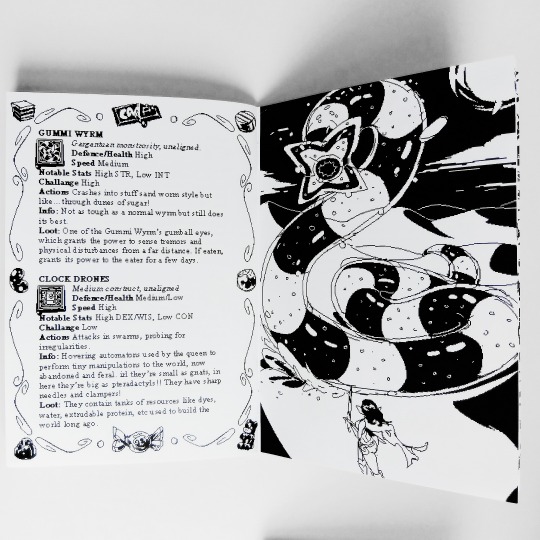
For example @xrafstar and @ramheadedgirl made a great little zine-sized book called Blood Sugar: Sweet Ambition. I doubt I'll ever actually get to play this (but never say never...), and as written it's kind of a nebulous state where it suggests stats for a D&D-like game but leaves the details vague... but it's using the format of an RPG book with its stat blocks and illustrations to tell a compelling story and provide a frame for Alco's gorgeous illustrations.
A similar example (which @lapinaraofperdition told me about) exists in Vermis I, an OSR-milieu artbook which assumes the format of a manual for an old CRPG. There is no such CRPG but it's all about the vibes. The book's on to its eighth printing now so people are well into this kinda thing.
This leads me on to one other function of RPG books worth discussing. This tends to be less of an explicitly advertised thing, but I think it's a huge part of things - amateur-anthropologist hat on...
An excuse to make up a story together - RPG book as seal of permission
Suppose I got a group of people together who had never played a TTRPG, and asked them to come to my house every week to make up stories about vikings. I think most people would find this a rather strange idea, and it would be quite a hard sell.
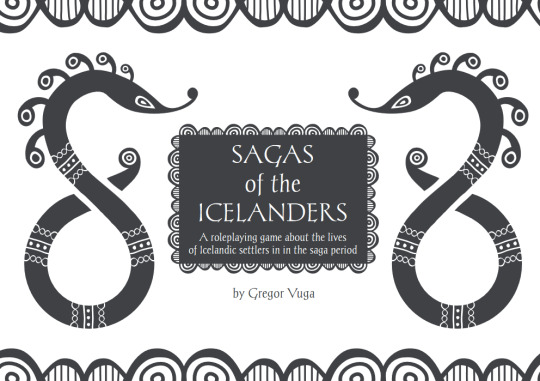
Suppose I got a group of people together who have at least heard of the TTRPG subculture. I have a book which says Sagas of the Icelanders on it, which looks like someone has put a lot of effort into putting it together, and costs some money. I tell them it's a cool new indie game I heard about that I want to try. Even easier if it's a game they've heard about like D&D.
This sort of overlaps with the 'auteur experience' category in the previous post, but it's sort of aimed on a different level.
When I was a child, I would make up stories on every long car journey - before that, my parents would do the same. It's normal to tell stories to children, and for children to play and make up stories through that. Now, adult life still revolves around fictional storytelling to a huge degree: in just about every society on Earth, we put tremendous resources into making and displaying films, distributing books, putting on plays.
But in modern adult life in the countries I know about, making up a fictional story is a very individual activity, and very much tied to the dynamics of publishing. If you're writing a novel, it's expected that you might think of trying to sell it one day. It is something that you specialise in. If you're good enough, it can be your job.
Playing games also gets codified and locked down: you go and join a basketball club, say, in which you are expected to learn the rules of basketball. Or play a computer game, where the rules are set by the game binary, which packages it up with other elements like music and images.
Only a few contexts give you permission to just tell a story. For example, if you're sitting around a campfire telling ghost stories. Or if the story is framed as something that really happened (whether or not it did). A joke is the major one, relying on the promise of a punchline.
If you want to tell a longer, collaborative story... well, it's lucky that someone invented a hobby called 'tabletop roleplaying', with its attendant books, magazines, forums and other subcultural trappings. You can point to that and say, hey don't worry guys! It's a done thing!
I mentioned earlier the 'conceptual inertia' of D&D. All these trappings are part of that inertia, continually performing and reinforcing the idea that 'D&D is real'.
In this case, the function of the RPG book with its glossy cover and brand name and slightly corny introduction to roleplaying at the front - and notably, its price tag - is mostly a tool to unlock this special social context where you're allowed to pretend to be an elf without it being, like, weird.
You don't need a book for that, not remotely - roleplaying has taken place on forums, in chatrooms, in MUDs, in MMOs, etc. etc. for nearly as long as we've had TTRPGs - but it is a useful tool to help you unlock the door, as it were.
In this it seems (thanks @play-now-my-lord!) that I am following in the footsteps of Roger Callilois, who offered the following definition of 'play':
it is free, or not obligatory
it is separate from the routine of life, occupying its own time and space
it is uncertain, so that the results of play cannot be pre-determined and the player's initiative is involved
it is unproductive in that it creates no wealth, and ends as it begins economically speaking
it is governed by rules that suspend ordinary laws and behaviours and that must be followed by players
it involves imagined realities that may be set against 'real life'.
Nothing about that implies that it needs a book to define its special 'circle', but elements like a subculture and book do help to bring it into existence.
On that front, let's also mention...
A way to unify the subculture - RPG book as common reference
Let's go back to reproducibility. It's not just about having something to sell.
A friend mentions playing in 'a Curse of Strahd campaign'. Curse of Strahd is an official 'adventure' for first AD&D 2e and later D&D 5e. Like most 'adventures', the book acts as a reference for a series of places and characters, and instructions for how to use them, advice on how to create a horror atmosphere, and so on. Some areas are mapped in detail, others have brief prose descriptions.
If your group has played Curse of Strahd, it probably hasn't had the exact same experience as another group. Much of the book is open to interpretation in all the ways we discussed. But, there's a good chance that you have had some experiences in common. Much like you can talk about the different areas you encounter in a computer game, or the memorable scenes in a film, you can talk to someone else who played the same adventure. 'How did your group handle the mimic door?' 'Oh it ate the rogue and we all had to form a chain and pull her out.' (This didn't happen, I've never played this adventure.)
The same also goes for more general setting elements and the game itself. An RPG lore book is something you can become an expert in. RPG rules are something you can get skilled in manipulating. And even if two D&D games take place in totally different settings, you have enough shared context to be able to know what it means for a Beholder to show up.
This is just as true of story games as it is for trad games and OSR, just with different emphases. Wanna be an expert in something? Perhaps you know the Apocalypse World principles like the back of your hand so you can give advice on how to MC it, or always know the perfect indie game for anyone's taste. And since indie games are often quite specific, two people who played the same indie game are likely to have something to talk about. Or maybe you just like to have long theoretical discussions about game design principles (*sheepishly raises hand*).
You don't remotely have to strictly follow what's in the book to take advantage of this feature. Players will constantly be recommending house rules, arguing about balance, criticising and modifying the game. That's part of the fun.
As the first post discussed, the process of defining the subculture takes place outside of the books too. In conversations, blogs, webcomics, forums, we continually hash out what this hobby that brings us together actually is. But, given that everyone's group is different, 'we probably looked at the same book' is one of the few guarantees you can make when you meet someone and learn they're into a TTRPG. Small as it is, it's a powerful starting point.
So what do we do with all this?
Well, it kinda depends which hat we're wearing, right?
For a designer, the important point to bear in mind is that an RPG book is only a prompt. You're not a computer game dev - you can't really be an engineer of a precisely tuned system where all the moving parts work together in precise harmony. You're writing a message to someone else through a noisy channel, and to my mind, they get the larger creative role anyway.
And it's not just that they'll take what they like and discard what they don't - they'll probably forget things that you put in the book, or read things in a way you didn't intend, or get caught up in the moment and fall back on familiar habits. For their part, though, they're probably not even looking for you to tell them exactly what to do and how to do it, in detail.
I tend to find many of the best moments in RPGs don't involve any looking at rulebooks. You're caught up in the story you're telling! You're feeling that feedback loop of mutual inspiration! That's what I'm personally looking for - the thing in the book is just a runway to get us towards that point.
So what are they looking for?
One view is that your job is to give them what they can't easily provide themselves 'in the moment'. There's a good article from 2016 on an OSR blog Against The Wicked City that describes it this way: if you improvise, you will likely come up with something that is either painfully generic or overly wacky. An RPG book, by contrast, ought to give you something novel, which someone has taken the time to flesh out properly. For this reason, it must avoid cliché, because it's easy to spin clichés and you don't need a book for that.
In Vi Huntsman's video, they criticise Root: The RPG for acting rather like a dictionary, attempting to clarify the trigger condition for each 'move' (a rules-construct from Apocalypse World, more on that soon) with exhaustive, repetitive elaborations. This is a fascinating corruption to me, since it seems rather opposite the ethos of earlier story games, which would much rather give you something vague and cryptic and refuse to explain. (...OK, I'm having trouble finding really good examples of that, but I definitely recall one-page games that consisted mostly of lists of evocative names and phrases). The players can be relied on to provide interpretations of whatever a Frost Shepherd might be.
The challenge to me here is to create something that gives your player enough that it's there when you need it, but still doesn't feel closed-off and is amenable to putting their own spin on it. This is rather a matter of taste.
Prose goes
On another, more abstract level, the aim of an RPG book is the same as any art: to make people feel shit and see things in a new way. This is getting back to the territory of Zendoe's comment above.
So let's get into it: why is Apocalypse World memorable, when so many derivative games borrow most of its mechanics and yet end up forgettable? Why would I love to play Chuubo's Marvellous Wish-Granting Engine even though I don't really understand how it works at all? Why do I still think about what Unknown Armies has to say about fighting? Why do I find most of Avery Alder's games offputting even if the design is novel and interesting? (y'know, beyond personal reasons that she was a cunt to my friends.)
If a TTRPG book is a device to conjure up a usable idea of 'the game' in your mind, the experience of reading it becomes really important. A huge part of what makes those games come alive in your head is that their authors can really write.
But it's not enough to just make a book that reads well, is it? The player needs the confidence to extemporise in the vein indicated by the book.
Jenna Moran's games fascinate me - but they're also rather intimidating. Her books are full of quirky asides and little jokes and stylistic flourishes. How do you play a game in a Jenna Moran way? I think if I got a suitable on-ramp like an existing group I could get up to speed, but it's definitely the kind of game which really highlights the complicated relationship between book and game to me. Which is to say I have the book but I don't feel like I could run this thing, and while I could closely read it cover to cover and rotate its ideas in my head, it would be way more helpful to join someone else's game and see how they do it.
On the other hand, Apocalypse World adopts a very conversational style of prose. It asks you to 'barf forth apocalyptica', it titles chapters things like 'advanced fuckery' and suggests you motivate NPCs with their 'clits and dicks'. It rather obtusely introduces the idea of 'moves' with 'to do it, do it' - meaning that you invoke the rules text iff a condition is met in the fiction of the game. It's stupid but in a really fun way. Apocalypse World the book has the feeling of someone sitting down with you and enthusiastically explaining the game.
Nobody taught me to play Apocalypse World - I read about it online (on the story games forums maybe?), which instilled an idea of 'what Apocalypse World looks like', got the book, liked what I saw; I ran it based on my interpretation of the book and what I'd seen online. On some level the whole process 'worked': a game was, perhaps imperfectly, reproduced in another group of people.
Something about Apocalypse World, then, got me feeling 'yeah I could do this!'. But did that have to be a game with a name and such? Could Vincent and Meguey had written the MC chapter of Apocalypse World as a series of blog posts giving system-agnostic GM advice? Perhaps, but I doubt it would have led to a whole breakout movement in the same way. It's useful to have a name to anchor things to. (Of course, there's more to Apocalypse World than that, like the whole 'moves' system which dovetails with its specified approach to GMing.)
I once ran a different PbtA game called Night Witches, about a real all-female unit of Soviet aeroplane pilots who fought in the second world war. It was a great premise for a game and was solidly designed as PbtA games go. Where I stumbled was the ability to improvise - usually something I enjoy a lot, but here I felt an urge to try and achieve historical fidelity on questions like 'what does a Soviet airwoman eat' and 'what's a plausible name for a nearby airfield' (I fucking looked at maps! such a fool). I don't speak Russian, so I would draw a blank when coming up with a name.
Clearly I should have dispensed with being historical here - it's not expected, not like my players knew better. But equally, this is where a longer list of concrete bits of random 'life in the USSR air force' flavour info would have been quite useful. The game gives you a reasonable amount of historical info, but I still felt out of my depth. Fantasy is much easier!
Running a game requires you to project a lot of confidence. You don't have to say you know all the answers, indeed I quite like to make my reasoning at least a little explicit - 'oh! what if we have this happen..?' - but you are setting the tone for the game. Confidence and enthusiasm will vary with each player to encounter the book and the experiences they bring, and it's often beyond the designer's control, but you can definitely frame your game in a way that's more or less amenable to picking up and running with it.
In the next post... a few options, hmm. We could examine the idea of 'moves' in Apocalypse World more closely - they're a bundle of a few different things, and perhaps we should evaluate how well that works, and what makes for a good move-based system. Or maybe we could revisit some of my previous game design efforts, like the RPG duels post - did I go astray?
#roleplaying games#ttrpg#tabletop roleplaying#story games#i'll collate this series on canmom.art for easier reading soon
16 notes
·
View notes
Note
Hi! 10kDays has had a vice grip on my psyche for the last week or so, and I'm really excited to play the preview. However, I don't wanna make anyone else in my group GM this game just because I want to play it, so I'd like to try out the GMless mode of play, and so would they, but none of us have any experience with that style of game.
Is there any game you'd recommend we look at for a general picture of how you intend GMless play to work? I do own Ironsworn, which has a GMless mode, so if that jives with what you're intending that would be really convenient lmao.
Thanks for your time!
So there's a couple of thoughts i have here, starting with the shape of the game and the pieces of it that need different kinds and amounts of attention:
The game itself is kind of designed in three strands: courses, combat, and the Face game.
Courses are an adaptation of the Arc/quest mechanic from Jenna Moran's Glitch. I've found that they reduce the GM load hugely, for two reasons: you can roll up half an hour before game, ask "who wants to be in the spotlight, what does your quest say is happening in your life right now, and what needs to happen?", and drop something in. Connections and debts are also designed to give you improv prompts, and to a slightly lesser extent perspectives. The other benefit of Courses is that they move planning burden from "GM, night before game" to "player, whenever they want to think about their blorbo". So on a large-scale, "figure out what the campaign looks like" view, you can get away with improvising every session and just following your own character arcs. Likewise, the District moves and intentions are intended to give GMs an easy "i don't know what to do next" button, and the focuses of mask/gear/bell are intended to share around the responsibilities of worldbuilding. Ironsworn's oracles are another example of how to help outsource some of that decision-making, and it's the reason Appendix Yi is earmarked to be a million random tables. For more information on how oracles work, please google Jay Dragon's Sleepaway on your work computer (or at least read this Twitter thread from NightlingBug).
There are a couple story structures that are well suited to wuxia and this game. There's the Shaolin Soccer/shadowrunner/classic ttrpg setup where you are clearly a team, and there are enemy teams, and you are doing hijinks against them. But there's also a Jin Yong wuxia epic type thing where you have, let's say three or four PCs, and you're maybe nominally on the same side but you're clashing a lot and you're tied together by sworn and blood kinship and you keep running into each other. I think the most pared-down version of 10kdays you could run and still call it a full game is 3 players, characters living sort of far apart so they rarely run into each other, and interactions are 2 of the PCs clashing at a time while the 3rd player picks up any NPCs, throws in some District moves, etc. You could do a 2-player game but the kinds of interactions you could have would be severely limited, I think. The Face game of politicking and building support structures is kind of just... you two, face to face.
Now the problem on everyone's mind is fighting. It's attention-intensive, everyone's interested in it, and depending on your setup there can be loads of combatants that a GM would normally be expected to pilot. Again, there are a couple of scaffolds for trying to do this GMless. The sample Techniques in Appendix Jia come with combat tactics to make use of them, so any player can pick up an NPC combatant and figure out what they're going to do. Fight choreographing like this runs the pitfall of it feeling sort of bad to hurt your friends effectively, at least for some tables, but there is the incentive of hitting your friend's Bite highlight when you grab the corpo thug and bite them in the ass.
It is one of my mid-to-low priorities to create like algorithm type protocols for enemy fighters to run themselves, though that's still in the pipe dream phase. One thing I'm looking at here is Katabasis by Rathayibacter, which has a super cool system for easily lining up combatant actions, enemy or not). Maybe I'll end up with literal combat loop Turing machines or something.
There's one more option here which is to lean the other way -- to foreground the GM themselves being a player. I'm talking Ryuutama dragons, I'm talking Fellowship Overlords. Obviously I one hundred percent have not added this yet, and I'm not even set that I will, but it's definitely a tool I'm thinking of to help manage the wuxia/cyberpunk/other bullshit genre merger. If you went this way, it would look like picking a district -- secret note, each district is built to amplify a genre. Gongshan is made to focus on wuxia/the bell, Jiaotou is made to focus on cyber/the gear, Youzhou is made to focus on punk/the mask, Jingcai Xin is made to focus on court and courtroom politics, and Yuanhai is made to play Nezha Reborn. Pick a district that corresponds to the genre the GM is playing as, turn those Moves into Heroic/Humbling Moves and the landmarks/NPCs into Treasures and Connections, turn the Intentions into Skills. Now you can combine this with what I first talked about, sharing out cognitive load, and focus on playing as a district/genre. Is that meaningfully different from being a GM, who let's recall still counts as a player at the table? I'm a sicko who loves being a GM so I'm unqualified to comment, but try out any combination of these options and see how they take you.
#ten thousand days for the sword#ill just automate all of tatterpiging its fine#larian did it its fine
24 notes
·
View notes
Text
A week in the life of a TTRPG addict (19/08 - 25/08)
Published a game
I publiseh another one page rpg : Chaos at Cosplay Con
Cosplayers have been taken over by their costumes, gaining their powers. The players are the only that are still themselves, despite gaining powers. For now...
I Played
This week, I played Knight. The end of the big, big campaign prelude. A big recurring boss. Its final battle to save Art itself ! Getting tired of the players rolling over some fights, not pulling punch. Then a player did 100 damge, counting the resistances and armor, a big 40% of the boss health in one go. needless to say, they saved Art. Now, due to how the ttrpg club is scheduled, the campaign is on pause for a season. Time plenty to modify every monsters and boost them. also read the rules, may be useful as the gm.
I was supposed to gm session 2 of a World wide wrestling mini campaign. Sadly a player out of 3 just didn't respond. Waiting for more news on them before deciding to continue with two or to search for additionnal players.
Receptions
This week, in the cart there was : Here, there, be monsters; Brave Zenith and Salamandur household, a setting supplement for Pacts & Blades that really needed it. Since I only received them Friday, I haven't read them yet. I started Brave Zenith cause i love a settting with playable jellies, and mixologist as a class.
I also completed my Knight collection with the Nodachi Supplement, instead of mecha-knight, here comes the mecha-samurai. And not ttprg, but tcg, since i published TCG oracle, I received my pledge for Altered TCG. Really Nice art, love the difference between common, rare and unique versions of cards. But I miscalculated. With the pledge came a display of boosters. So i thought Hey let's buy an album for al these cards. I too, the 360 cards version in the kickstarter. Except...the display is 37 boosters, each with 14 cards. This doesn't math. Luckily I had an other album with some place in it.
I read
I love the Shangri-La Frontier manga. Already reread it several time. So to check a rpg that could play this, I read DotDungeon remastered by snow again. I love the interaction between the real life of the plmayer and the mmo characters. Things based on how many piercings the player have, their tattoos. The goal of exploring a world. Really want to play this
6 notes
·
View notes
Text
A Quick Breakdown of a Few Non-D&D TTRPGs (and how they compare to D&D)
hi it's me, your local ttrpg player and forever-GM, encouraging y'all to play something other than d&d. i wanted to share about a few ttrpgs in particular and how they compare to the d&d experience. this might be useful to some who want to try a non-d&d system with a little more guidance than "all of these look cool." i'm focusing on the three systems i have the most experience with, and i'm not going to delve into the game mechanics, but rather focus on the game experience.
also, hey!! if you learned to play d&d, i promise you, you can learn another system. d&d is complicated and often expensive, but other ttrpgs aren't necessarily like that! most ttrpgs, in fact, are much simpler than d&d and easier to learn. so don't let the barriers you may have faced with d&d discourage you from trying a new system.
Savage Worlds
experience: player in a homebrewed setting for about a year.
overview: savage worlds is a setting-neutral system, so it really lends itself to homebrewed worlds. character creation is looser and more flexible in some ways than d&d. you piece together the character you want rather than using a set class/race. i would say the biggest difference between savage worlds and d&d is what the name itself implies. the world can be savage! the dice are swingy in this game. you might be great at a skill, but it doesn't guarantee success the way it pretty much does in d&d. wins and losses tend to be bigger and more dramatic.
what i love: your "class" feels more customized to what you want. savage worlds rules can be implemented in all kinds of settings and worlds which is cool. "balance" isn't really an issue the way it is in d&d (but be prepared for those swingy dice!). combat can be deadlier in some ways, but the system doesn't rely on combat the way d&d does.
Blades in the Dark
experience: GM of a campaign for several months.
overview: blades in the dark is about a group of scoundrels, being scoundrel-y. my favorite line from the player's handbook is that you should play your character like you're driving a stolen car, and i just love that metaphor so much. blades is a game where you play bad people doing bad things (crime). you roll a number of d6s and if you get a 1-3, you fail; a 4-5, you succeed with a complication; a 6 is a total success. what this means in-game is that almost every roll you make results in something bad happening. this leads to a chaotic game experience where the pressure is constantly building until something explodes.
what i love: as a GM, i never prepped for more than 15 minutes before a session. you don't need to prep at all as a GM (either way, be prepared to improv your ass off!). the mechanics are also a delight and i know i will use some of them in most of my games moving forward (clocks! clocks are genius). it also has more of a collaborative feel than d&d. you and your players are making it up as you go and it FEELS that way, which is so fun.
Pathfinder Second Edition
experience: GM of a published adventure for just a few weeks!
overview: this is probably the system most similar to d&d. a lot of the skills, dice mechanics, spells etc will be familiar to you. if you like d&d mechanically but want more crunch and more balance, pf2e is a great option. it's definitely more complicated than d&d, but i don't think it's too complicated, if that makes sense. combat is easier to balance from the GM side and feels more dynamic in many ways at level 1 than d&d at any level. also pf2e has a sense of humor??? it's hard to describe but so many of the feats, spells and monster abilities are FUN in a way that's lacking in d&d. i plan to run my next campaign in pf2e and am excited to delve into using it for a homebrew setting.
what i love: character customization is off the fucking charts. if you're a 5e player, you'll be astounded at just how many skills and abilities you get every level-up. also, it's a game that's balanced, which as a GM i've noticed right away. combat is fun to run (i have NEVER said that about 5e lmao) and feels like you're actually playing a game, rather than giving a presentation the way a lot of 5e combat feels as a dm. every monster stat block is interesting and unique. and there's a rule for everything, which i personally like.
anyway, i hope this was useful! get out there and try a new ttrpg system, okay??
#ttrpg talk#dnd talk#ttrpgs#ttrpg community#blades in the dark#pathfinder 2nd edition#savage worlds#long post
121 notes
·
View notes
Note
hit me with some ed-canons!
OH BOY
It is always so funny how I love having excuses to talk about these guys, but the moment I am put on the spot I literally forget everything. I'll try and list a few for each.
Ed:
This isn't at all an uncommon head-canon for Ed, but I really do see him gravitating to creative careers. Things like filmmaking and cartooning. Hell, they already establish in the show that he kind of has a photographic memory in regards to penmanship, so he might even have an opportunity in graphic design. I don't really see him becoming fully professional since, realistically, it is a hard industry to have success in exclusively, and I think his struggles with things such as attention span and memory would also be significant obstacles. Creative stuff would definitely be best as a side gig or a very passionate hobby in combination with a more stable manual labor/construction work job.
Throughout the rest of middle school and high school, Ed continues to work for Rolf as a low-pressure farmhand. He especially likes working in the springtime when the baby chicks hatch :3
Ed gets really into dnd and ttrpgs. He regularly tries to drag Edd and Eddy into doing some campaigns, even though neither of them are that invested. They humor him though and play some, but they are incapable of ever finishing them because Edd and Eddy always end up arguing about something and Ed has trouble remembering what they did last.
Edd:
On top of having trichotillomania, he has tendencies for other body-focused repetitive behavior like dermatillomania, dermatophagia, and onychophagia.
Edd doesn't only have an ant farm, but he's dabbled in other kinds of insect/arachnid keeping. Mostly things he's found outside. He's kept caterpillars, ladybugs, spiders, and mantis. He always tends to release them once they've reached adulthood, but sometimes, his curiosity turns morbid. He absolutely takes too much advantage of his parents not being home to put whatever he wants in the freezer. He's probably also tried bug pinning. He is especially interested in the order Hymenoptera.
Starting in high school, he starts to take higher level courses, which means he doesn't have any classes with Ed and Eddy other than lunch and extracurriculars. He doesn't experience so many problems with the classes themself, but more so that he finds it extremely alienating and lonely. On top of intimidating and confidence-killing, since he starts to realize there are people out there who are way smarter than him.
Eddy:
Mostly bonded with his dad through movies, which is why his taste skews a bit more old-fashioned (granted, he was definitely enjoying those cowboy films for an entirely different reason than his dad was 💀). He's extremely impressionable. He probably bases his personality off of a different classic male lead every week. One day he's going for Humphrey Bogart, the other he's John Travolta. It keeps things interesting.
He has dyslexia. Good luck trying to tell him that, though. He'd rather die than admit that.
He's really good with kids, in a naturalistic "funny uncle" kind of way where you talk to them as if they are just little adults. That doesn't mean he's the best role model in any way. He's definitely sold pot to 14 year olds while in high school (Edd made sure he never heard the end of it).
#so sorry this took forever I had classes and hw you know how it is#thank you for entertaining me though I am so normal about them#these might be things I've mentioned or implied on here before but whatever lol#implied animal death#<- tagging just in case#ofc in relation to edd the weirdo#jk I also used to dissect flies and put them under my microscope#headcanons#eene#asks
18 notes
·
View notes
Text
Gameplay Diary 3/11/2024
Hello, short post this week as things were mostly the same as the last session. A lot of roleplay and trying to learn about NPCs. The main topic I want to focus on is actually my friend's game, which we played right after mine. To give background, the other players and I were sent to find out what was making the population of a dungeon act aggressive towards the inhabitants of the village. The first issue that we came across was the fact that we were told that our reward for the quest was based on how many creatures in the dungeon we left alive. The second was the fact that we were on a time limit without information on how long we would need to spend in this mine. The third was that the NPC who gave us the quest had no other information or leads to give us outright. This leads to a group of four adventurers going into a dungeon with a strong “Do not kill” protocol in mind which then leads to all of us running through the dungeon to find the source of the issue as fast as possible. Not ideal if you worked on the dungeon as he did but the optimal strategy for a group who has such limited knowledge. Now the blame can easily be placed on us as players. We didn’t search out any information but, to us, this dungeon could have been large and demanded every second of our time. The problem with a GM blaming players is that it never works. As a GM you should expect players to show up, play your game, and do nothing else. The people you play with are smart, cunning, and good problem solvers. Players, with a capital P, are flighty, quick to act on limited knowledge, and prone to running into more problems than they can solve. All of this made me consider the idea of how GMs make dungeons. There is a large amount of information on how to make an interesting dungeon. The five room rule being one that many people look to along with the ideas of different elevations, a theme that spans through the puzzles, fights, and lore, and ways to guide players through a dungeon so they see everything you want them to. I would like to take all of this game design knowledge and transform it into a way for Providence’s to follow a few steps or guides that will lead them to making an adventure, dungeon included, that helps the Providence know how much EXP each section gives, what kind of knowledge is necessary for the players to not get blindsided, what kind of knowledge is beneficial but not crucial for the players, and how to have different parts of the adventure flow into one another. This is a daunting task as the modularity of an adventure and the Providence’s ability to improv when the players go off of the plan is one of the largest draws for TTRPGS. The idea of just throwing a Providence to the wolves, saying something along the lines of “Dungeons are things in the ground and adventures are fun romps you experience with friends, you figure out the rest” irks me as the GMs, especially those who are new or don’t research level design, can fall into simple pitfalls that make an adventure not live up to what they expect. My main goal of the mechanic will be to assist in avoiding these pitfalls while also keeping the “Adventure outline” simple and easy to make so that a Providence can make up additional sections or entire adventures using the system without too much strain and without ruining the flow of the game. If anyone has any advice with things that are similar to this or have any questions, feel free to send an ask or a message!
7 notes
·
View notes
Note
if you have the time, what are your favorite ttrpgs? I'm interested in getting into the genre but dnd is kind of hard to break into. Again, you don't have to answer if this would take too much time to explain. Thank you!
So I’ve played about 35 different games, mostly one shots. I’ve had the benefit of playing with people I trust which can greatly influence game play. Below I’m going to include the full list of games with brief descriptions, but favorites first.
I definitely prefer non-traditional, narrative, and gmless games, so that will be a running theme.
Tales From the Loop has to go first because it’s the game that made me fall in love with ttrpgs. This game has Stranger Things vibes. You play a preteen in the 80s in a town where weird shit is constantly happening. This game is more on the traditional side. There’s a GM running the story, you roll for skill checks, there’s probably a specific story playing out that your gm will try to hook you on to. This game uses only 6 sided dice. There is a sequel listed below for teens in the 90s.
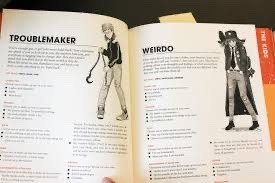
Fall of Magic is a narrative rpg with at most 3 dice rolls in the entire game. FoM is played on a beautiful, handmade map. Your characters progress through the cities on the map as you collaboratively tell the story of your journey to the birthplace of magic. Every city on the map has locations in it with a narrative prompt. Each player decides what location to visit and acts a scene at the location answering the prompt. Anything you say becomes true. There are no rolls. Nothing makes me want to write an epic fantasy more than a good game of Fall of Magic
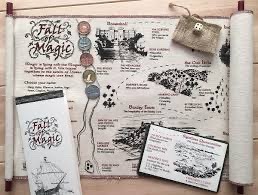
Pasión De Las Pasiones is a PBTA game, which is one of my favorite systems. In it you play a character from a long-running telenovela. I suggest only playing with a gm familiar with the genre who can do justice to the setting. There’s lots of scandal and intrigue. In fact one of the possible characters to play is the secret evil twin of any of your fellow players. PBTA gamesone are closer to traditional with dice rolls and a gm, but emphasizes the narrative more. Rolls are based on you committing to certain tropes and are boosted by narratives rather than any sort of character skills. (I also suggest checking out other PBTA games.)
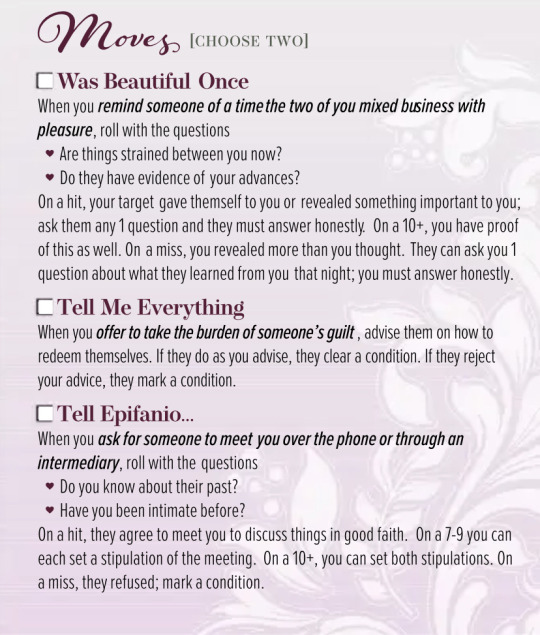
A Quiet Year is a map drawing game. All you need to play are a deck of cards, a printout of what the cards mean, and drawing materials. You tell the story of a community rebuilding after a harsh winter, answering prompts from the cards for each week of the year. As you build the village and create the story, you draw a map to show all you have done. No artistic skill is necessary. You do not play a character in this game. There is no gm. There are no dice rolls. This is the map from my last game. (I prefer to use wrapping paper for more space)
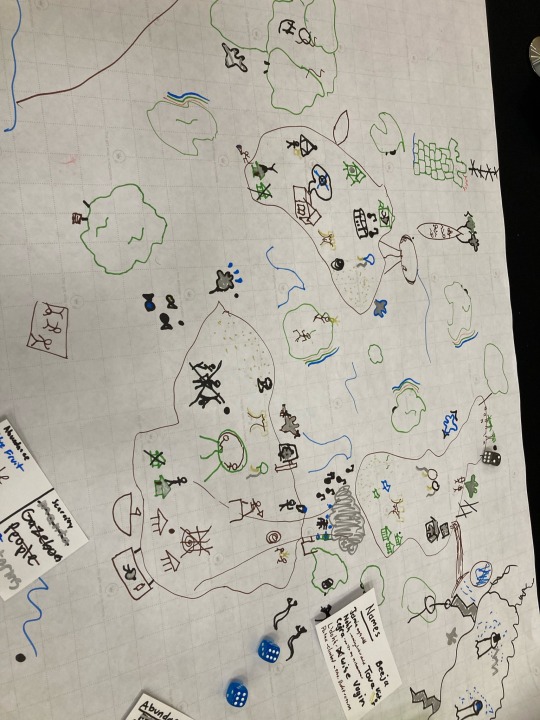
Dialect is a language building game in which you collaboratively make up new words that become completely normal to you through play. You play as members of an isolated community of any sort (lost mars colonies, online message boards, a thieves guild) which breaks down over the course of the game. You play out the evolution and eventual dissolution of your joint language. Each turn comes with a prompt for which you create a word and then play a scene. This is great as a stand-alone but I love the idea of using it as worldbuilding for a larger campaign.

I will hopefully do another post talking more about someone games tomorrow
(Warning for q slur used once below cut)
This is a list of all the games I’ve played with a short description for each. I do not recommend all of these, but feel free to ask more about any of them. I’ll talk more about some of these in future posts.
Masks (teenage super heroes. PBTA)
Paranoia (dystopian bureaucratic comedy horror)
Weave (app based multi genre. Left very little impression for me)
Tales from the loop (80s teenage horror mystery. D6 based game)
Things from the flood (90s teenage horror mystery. Sequel to above)
Descent into Midnight (map drawing game. psychic underwater entities in a community fighting an influence. PBTA.)
Dream askew (queer enclave as society falls PBTA. Book also contains a jewish companion game set in a shtetl, Dream Apart)
Rippers (dark Victorian. supernatural hunters)
Pasion de las Pasiones (telenovela the rpg. NDNM)
Fall of magic (map based, gmless, story telling game. High fantasy. I own but have not yet played their second scroll game City of Winter)
-
Fiasco (multi genre heist-gone-wrong game. Gmless. D6 based)
Inspecteres (ghostbusters-esque, bureaucratic comedy. Some mockumentary elements.)
Dnd (we all know this one)
Quiet year (map drawing, gmless game on the growth of community)
Dialect (linguistics based game telling the story of a collapse of community)
Microscope (world-building game played over the course of an era. Great for works building for a larger campaign)
Lady blackbird (single scenario game- helping a noble escape arranged marriage. Steampunk)
Lasers and feelings (Star Trek, basically. One pager. Great for new players and gms. Good system to build a home brew based on)
Castle falkenstein (steampunk+fantasy adventure)
Headspace (cyberpunk, anticorp. Emotionally intense/triggering)
-
Mouse guard (mouse fantasy adventures)
Numenara (science fantasy adventure game. Earth based, 1000 years off)
Manifest (sci-fi western)
Damn the man save the music (employees try to save their dying indie record store and achieve their personal goals. 90s)
Ryutaama (npcs travel and experience the joy of existence)
Dead Halt (a hotels AI has gone rogue. You work there. Try to survive. Horror-ish but in a campy way)
Knave (a very simplified fantasy adventure game)
Thirteenth Age (similar to dnd with a few unique interesting features. Made by creators of dnd 3&4)
Anomaly (tarot based gmless game about a sinister organization investigating supernatural anomalies)
Visigoths vs. Mall goths (conflicts and romance between the warriors who sacked Ancient Rome and 20th century spooky teens. Takes place in a mall in 1996)
-
Arcana Academy (magic school game. Don’t play with strangers because they will fall into HP tropes)
Alice is Missing (silent game played over discord or similar. A mystery is solved through texts and group chats
Worlds Without Numbers (large world fantasy adventure game. OSR. Similar in concept to dnd but with plenty of differences. More human centric)
Nahual (Mestizo shapeshifting angel hunting underdogs)
Sign (sign language building game. Deaf children develop their language collaboratively in a new school setting. Played silently.)
#ttrpg#ttrpg community#dnd#fall of Magic#tales from the loop#a quiet year#pasion de las pasiones#long post#dialect#dnd isn’t the only game#answered#lucky charms#one of the six or one of one of the sixes
27 notes
·
View notes
Text
The Axes of TTRPG Game Design
All the way back in Issue #69 of the Indie RPG Newsletter, I linked to a series of episodes from the Ken and Robin Talk About Stuff podcast about the “axes of game design”. I've been thinking about them again recently and thought it might be interesting to look at each one. I'll be referring to the summary on the Pelgrane Press blog as I comment on them.
So the basic exercise is trying to figure out the standard axes or spectrums on which every game can fit. The idea is for these axes to be as descriptive and objective as possible. While there is always going to be debate around the classification of specific games, the idea is that in a perfect world with perfect communication, that debate would have a truly correct answer. We don’t live in a perfect world but I'm happy to discuss things like this forever.
So here we go:
Elegance versus Ornamentation
"A game has Elegance if all of its subsystems work in the same way, stemming from a central resolution mechanic, or is Ornamented if its many subsystems work in different ways"
So the first axis is one of the strongest and makes a great example of the level of objectivity we can hope to achieve here. In some sense, the degree to which a game falls back on a single unified mechanic should be clear and measurable. At the same time, it’s not any indication of how “good” a game is. One-page games are highly elegant but they’re by no means “better” than longer games.

One thing that's interesting is to see where PbtA falls on this spectrum. A game like Monster of the Week is pretty elegant because everything is essentially 2d6+stat. But does the number of moves, especially moves like Big Magic where you negotiate the effects of a spell or ritual, push it toward being more ornamentated?
2. Wide versus Focused
"A game has Width if it supports play equally well over a long progression of power levels, or Focus if it works best at a narrower sweet spot."
I think this is where it’s probably best to start moving away from Hite and Laws’ wording. I think terms like “power level” is a wargame hangover. I think this is better phrased as “kinds of characters”. A game that is Wide is designed for a many kinds of characters. A game that is Focused is designed for specific characters or types of characters.

So you get something like Lady Blackbird (which has a cast of named characters on one side) as Focused and Risus (which is as generic as it gets in terms of character creation) as Wide. And yes, I put D&D 5e in there because I revel in the symphony of a hundred angry keyboards click-clacking away.
3. Directed Emotion versus Emergent Emotion
"A game can have Directed Emotion, stemming from rules that lead you to feel a certain way, or Emergent Emotion, in which the reactions of players and GMs stem from the story content they introduce."
This phrasing is a little clunky because in their discussion, Hite and Laws felt that something like “Emotional versus Detached” was uncharitable. And I understand. But I also think that “Directed versus Emergent” is a bit like saying “Designed versus Undesigned”. I think the premise of the exercise that is “undesigned” isn’t a thing. If we want to describe a game as “neutral” on some axes, it should ideally fall somewhere in the middle. So I propose Hot versus Cool. Hot games try to stoke up emotions in the players. Cool games try to cultivate an air of cool, ironic detachment. They don’t want you to feel too strongly about the events of the game.

(The original article also mentions “Abstract rules for their mathematical or formal attributes, or Emotional rules when they grow out of the feelings they are meant to evoke at the table.” but this feels like it overlaps heavily with this point now.)
4. Applicability versus Versatility
"A game has high Applicability if it is designed for a single highly specific player character core activity, or Versatility if it supports many possible core activities."
This is just Wide versus Focused for mechanics rather than characters. On one hand, they’re separate things. On the other hand, it’s clearly related. It’s a bit hard to imagine how a game might support wide characters with focused mechanics or focused characters but with wide mechanics, right?
5. Simulation versus Emulation
"Games that focus on Simulation resolve events as they would unfold in a causal reality, or engage in Emulation, so that events unfold as they would in a movie or book, to keep the narrative running in a satisfying manner."
I’m not quite sure about this one. I’m struggling to understand which games commit to simulating real world physics. What’s the game on that end of the spectrum? I know OSR games revolve around the GM arbitrating physics impartially but in a game where dragons exist, how seriously do I take that claim? They would probably be in the middle of this axis at best if you ask me.
6. Ease versus Mastery
"A game favors Ease when players can pick it up and run with it right away, or Mastery if it presents complex or elaborate rules or setting material, favoring those who take the time and brainspace to learn it."
For me, the important thing to ask ourselves here is whether the word “player” includes GMs. If it does, all rules-light games that might seen to favour Ease are not so easy anymore. (Which reminds me that I never actually talked about “affordances” as a design concept - an article for another day.) If we limit ourselves to “player facing mechanics”, then yes, I can see the spectrum. The problem is, of course, it looks exactly like my Elegant versus Ornamented spectrum.

What kind of games are Ornamented but don’t reward Mastery? What kind of games are Elegant but don’t favour Ease?
(The original article also uses a "Harmonica vs Violin" axis with Harmonicas being simple to play and Violins requiring more work. I think the overlap here is high.)
7. Canon versus Open
"When it comes to setting, a game oriented around Canon presents a detailed setting with a set continuity meant to instill the same suspension of disbelief we apply to SF and fantasy worlds in traditional media. Open settings arise from the authorship of GM and/or players, with plenty of room to make stuff up as you go along."
This seems really clear. And I think examples might be unnecessary.
8. Randomness versus Choice
"A game or system dependent on Randomness uses die results to work out what happens. A game that privileges Choice has players and GMs decide."
This also seems clear. Some games don’t give players the power to just choose what happens next. Some games push players to decide when they want spend resources to just make a specific thing happen.

Okay, so does that all check out?
64 notes
·
View notes
Text
The Best of Me 2023
I did a ton of writing on tumblr this year, with at least one post a week but multiple weeks with 2 or 3 posts in a week. I've worked hard to make writing that is relevant to my fellow sapphics and artists. I want to talk about the stuff I wrote this year I am most proud of.
Note: This list does not include my articles for Anime Feminist because they are professionally edited therefore a cut above anything I am posting on tumblr but please do read them here and tell them you want more articles by me [I actually have more to write for them ooops].
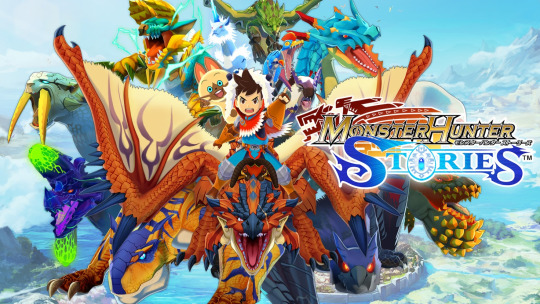
Why Hunt Monsters?
I am so proud of this little article, for me this is one of the things I feel very strongly about. As a TTRPG player I have found myself retreating from a lot more games because I just can't get behind, we murder monsters plots and I was really happy to share my perspective on this fairly taken from granted feature of games.

How To Find Sapphic Media
This little guide to finding Sapphic Art was really important to me because well, I was really tired of seeing people say there was not compelling art about and by sapphic women and so I wanted to make a base level resource for finding amazing sapphic shit.
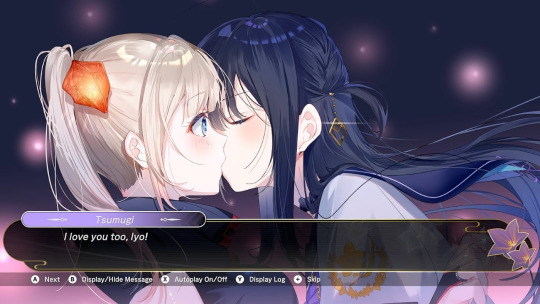
Sapphic Games Goddess List
In my efforts to make Sapphic Art more known I have worked really fucking hard to research what sapphic games are coming up so people wouldn't even have to put in the effort to go hunting them down. I want people to be able to live out there sapphic dreams and so it's important to me to share what I am researching for my own play time since I at this point really only play games I can be a lesbian in or otherwise are standout in gameplay with probably no romance instead. I even did an updated version of this list since most of the games on the first list have come out and I am working on the next one as we speak with more new additions gearing up.
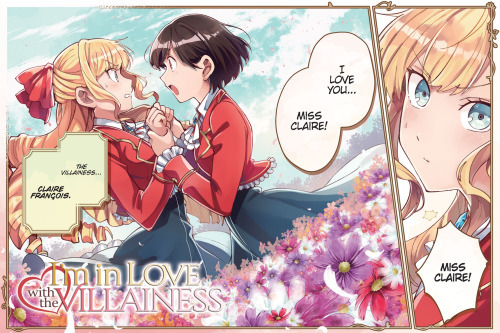
Why Obsession Hits Different When Gay
I love diving into queer theorizing. I am not going big brain citing a ton of people or doing a lot of academic research but I like to share my own thoughts, experiences and the stuff I have learned over years especially as a writer and general creator of sapphic art. I think it's a perfect little rebuttal for folks who may claim there is a "double standard" that lesbians have or something.
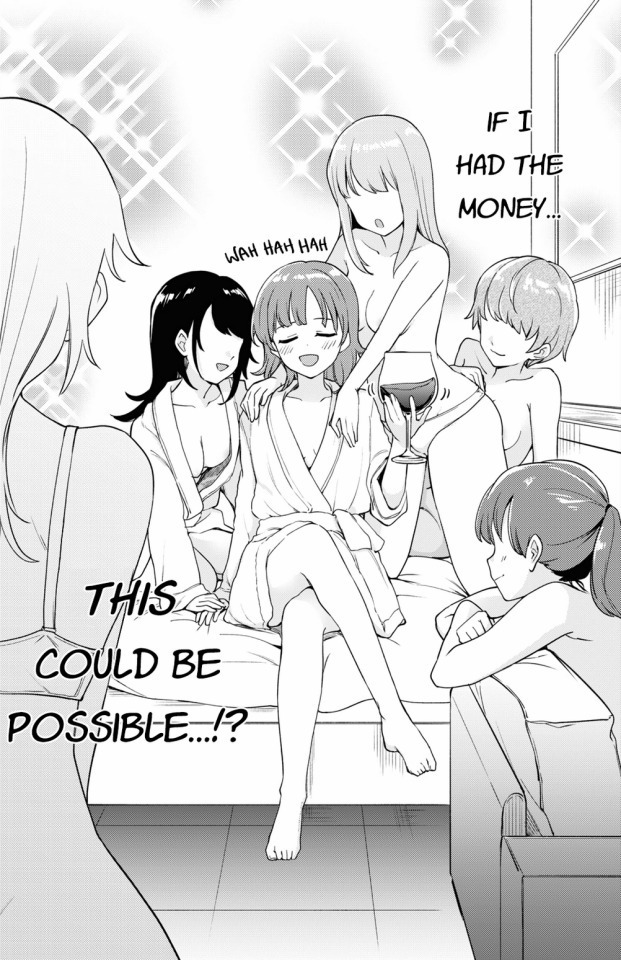
Polyamory Is Queer
This is a deeply personal little blog post I did where I talked about why polyamory is so important to me and why it is in fact queer. I have seen so many people demonize polyamory over the years and I was just tired of seeing people in my own community bullying other polyamorous folks.
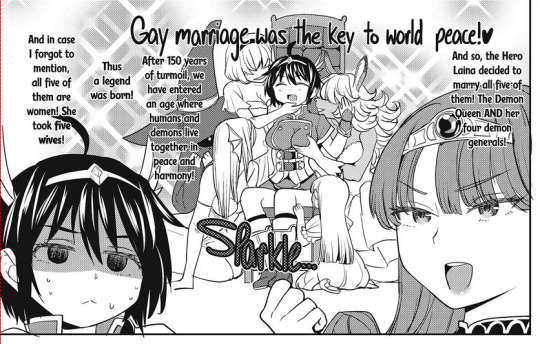
Fantasy Vs Sexuality Labels
As a writer this is maybe one of the things I feel most passionate about a creative choice for my fellow queer creators. I really wanted to make my case on why we should use labels in fantasy worlds and why these labels matter for stories.

My entries for Edelgard Rarepair week and Monica Week
I from time to time to time write fan fiction and I had a blast doing it this year for two different week events going with both the Edelgard Rarepair week and the Monica fics week. I love Three Houses/Hopes so it was a blast to throw my passion into something even if in general I don't like to be a free marketing arm for companies by making creative works like those.
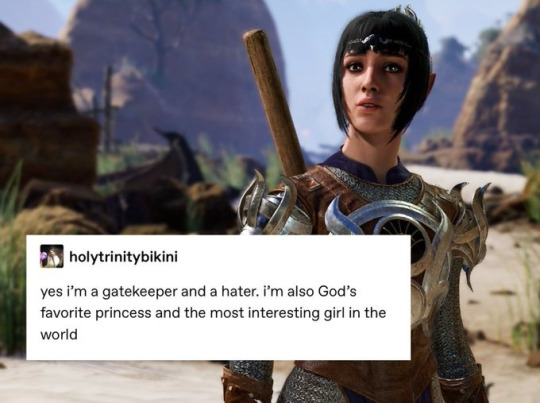
TTRPG Characters Need Trauma In Their Backstory
I had one person who utterly hated this post and started attacking me in basically every post I made on some social media site I abandoned because of it. That alone makes me love this post even more because it made me sit down and think about this post and feel even more assured that what I wrote is correct and that trauma is in fact needed for TTRPG characters. I think I wrote something that really dived into the idea of what is trauma, how trauma relates to us as humans and why it's basically propaganda to remove us from trauma.

Trans People Deserve More
I feel super strongly about this article, I sat on it for a long time but I've met so many other trans people with awful relationships and mild relationships with their family. I wanted to make a shout out to all my fellow trans folks to tell them that it's okay to demand more, that we don't need to settle.
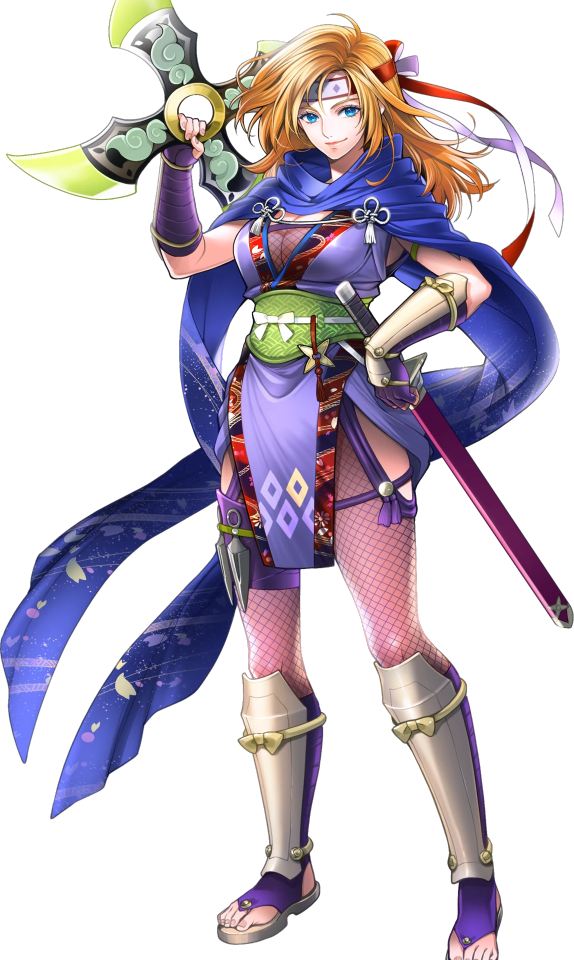
A Dive Into Heather
I adored diving into one of my all time favorite Fire Emblem characters and it's something I've wanted to do more of. I'd love to do more dives into characters in video games I like and I did well before this post have a series of drafts that I still have up as a series that particularly is just a bit by bit break down of Edelgard's political beliefs.
6 notes
·
View notes
Note
Hii, do you have any recommendation for games the take place in a magic school?
THEME: Magic School
Hello! I certainly do! These recommendations are meant to give you options that allow you to explore new ways of playing in magic school settings, especially pushing the boundaries when it comes to playing in magic schools. Even better, these games don't line the pockets of influential bigots!



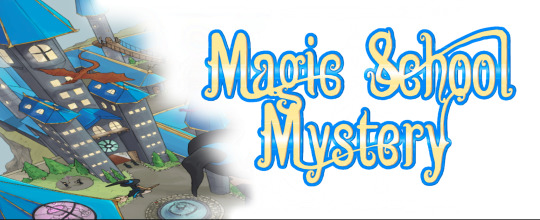




To Teach Their Own, by Mousewife Games.
To Teach Their Own is a game about a small group of grown-up witches teaching student witches valuable lessons about magic. It pulls from things like The Magic Schoolbus, The Wizard of Earthsea, Little Witch Academia, Strixhaven, and more, to tell classroom-adventure stories from a new point of view.
Instead of retelling the same stories of plucky students in a boarding school with the world on their shoulders, this game invites you to witness and play from a different point of view: you'll play teachers who have come together to take a group of magically-adept students on a field trip to remember, where everyone has the opportunity to learn something new.
To Teach Their Own is a Forged in the Dark game with some significant twists. You build your instructor by writing Expertises, which stand in for stress and quirks from other Forged in the Dark games. To refill your Expertises in-play, you'll pick two triggers specific to your playbook, each of which you'll hit during the course of play, like the keys in Lady Blackbird. For me, the mechanics plus the motivational keys are what really stands out - and on top of all that, you have a new way of looking at a magical school. Rather than children, you’re adults in a magical world, with responsibilities and consequences that make every decision that much more important.
Magical Pets, by Plotbunny Games.
"Magical Pets" is a cute little game where you are the pets of students or staff members at a magic school. Since your humans are busy all the time, it falls to you to take care of various problems that befall the school...
Be a gruff miniature unicorn who can read, an elegant sheep with an excellent nose, an eccentric cat who can levitate small items, a clumsy raven who specializes in fluffiness or any other talented, magical pet you want to be.
This rules-light game (a hack of Lasers & Feelings) is ideal for a no-prep/low-prep one-shot or few-shot. You can also use it as a starting point for a longer campaign and just keep playing to find out what happens next.
Magical Pets is a great way to explore a magic school from a point of view outside that of the student’s! What do the pets get up to while their caretakers are in class? What areas of the school might be off-limit to students that the familiars can get into? What adventures happen around the school that none of the magic-users are aware of? This is also a perfect little game if you need a pick-up game on a week that everyone can’t make it, or even to tell a new story in a magic school setting that you’re already invested in.
Adiotopia, by Minakie.
Adiotopia is a micro TTRPG (for 3+ players) about collaboratively telling the stories of a group of young Protectors in training, who travel between their world (Sanubari) and Fäerie with their mentor in order to help both Saubi and Fae deal with their everyday problems, enforcing the law, mitigating conflicts, protecting people, studying the indigenous fauna and flora and potentially solving mysteries, while always being on the lookout for the dangerous darklings and the unpredictable undead. If you're lucky, you might befriend the dragons or the elves, or even learn a magic trick or two along the way.
The premise of the game is that the world is full of creatures and mysteries worth investigating and that, while some of them might have a simple and rather ordinary explanation, others might not be what they seem at first, and be somehow connected with the multitude of mystical creatures that inhabit the land.
This is a fundamentally different kind of magic school game, in which magic is connected to another world, rather than your own. Your school isn’t inherently steeped in magic - rather, your characters are being trained to interact with items, creatures, and people who are magical, without having any inherent magical powers yourselves. This doesn’t mean that you don’t have any magical powers - but rather that uncanny abilities are few and far between. This represented by the special number you see in many Lasers and Feelings games. Rolling over or under a predetermined number is what’s required for basic success, but hitting your number exactly? You get a moment of sudden clarity, and are able to use a magical ability to give your character an edge.
Magic School Mystery, by Tannerjwil.
You’ve been accepted to wizard school!
Can you solve the mystery before it’s too late?
Become a student and investigate the mysteries of Magic School Castle. Solve clues, cast spells, and cause mischief in this genre-focused and rules light tabletop role-playing game!
Magic School Mystery takes notes from games such as Apocalypse World, and Damn the Man, Save the Music. It follows player characters over the course of a school year, as they attempt to uncover a mystery. The mystery itself isn’t set out by the GM - instead, it’s discovered collaboratively, with a rough concept established by the GM and questions answered by the Players as they investigate.
Apart from the basic rules and character creation, this book also comes with an outline for spell creation, GM advice, and example NPCs and mysteries to put before your players. If you enjoy the idea of discovering the nature of a mystery together, Magic School Mystery might be worth checking out!
Tailfeathers, by Jimbozig.
In Tailfeathers, you play as a student at a magical school. Your character is part of a group of friends at the school, and together you will through curiosity, bravery, greed, and tenacity find yourselves in over your head entangled in the machinations of older wizards.
You will also play Kazzam, a sport of spellcasting and tactics with a capture-the-flag element and dangerous monsters. Based on the tactical combat of Strike! RPG, Kazzam brings the feeling of real competition with unexpected combos, wild comebacks, the thrill of victory and the sting of defeat.
Tailfeathers works in a cycle of play, where your characters will move from a match of Kazzam, to a series of Investigation actions, to a Downtime. Kazzam is a structured mode of play similar to combat, with easily defined goals and a special separate rulebook that details the goals, obstacles and character options available for your characters on the field. Investigation is a combination of social role-play and shenanigans, with graded levels of success and a special result called a Twist. Downtime allows for you to do character upkeep - resolving injuries, managing their social life, working on projects, and advancing your character.
This is a game with a lot of pieces that put your game together, but the result is structured play with a lot of potential for a rich, complex campaign.
While the Tailfeathers Core Book is available for Pay-What-You-Want, there’s also the GM’s Toolkit, a supplement that contains Kazzam content, a mystery map, GM advice, items, and a first-year framework to get your campaign up and running!
Kids on Brooms, by Renegade Studios.
You pull your wand from the folds of your cloak, and its glowing blue end illuminates the door in front of you—the entrance to the banned books section. You watch as the copper snakes twist and turn around the lock that keeps students like you out. But you’ve been left with no choice. Your barn owl hoots softly upon your shoulder as you raise your wand to the knob and whisper the unspoken words.
Kids on Brooms is a collaborative role-playing game about taking on the life of a witch or wizard at a magical school you all attend- a place full of mystery, danger, and thrilling adventure. From dealing with strict professors to facing down mythical beasts, players will get the opportunity to ride brooms, brew potions, and cast powerful magic as they uncover the incredible secrets their school and its inhabitants hold. Built using the ENnie Award-Winning Kids on Bikes framework, it is a rules-light, narrative-first storytelling game perfect for new players and gaming veterans alike!
Kids on Brooms provides you with a chance to collaboratively build a magical school, which means that everyone has a chance to contribute to the kind of story that you’d like to tell. You get to decide where you school is, what kinds of rumours surround it, and the activities your kids get involved in together. Does your magic school have mermaids? Robots? Does it teach necromancy? Is it well-known or a well-kept secret? You get to decide!
One of the things I like the most about this line of games is the character connection questions - your characters will have some kind of connection, whether it’s a positive one, a negative one, or just a rumour they’ve heard about each-other.
Academies of the Arcane, by Melsonian Arts Council.
Academies of the Arcane is a role-playing book and the next official release for Troika! Numinous Edition. While it is intended to support Troika!, this new book is a comprehensive toolkit—it will work as well with any game where you might need magical schools, students possessing horrifying cosmic powers, and manipulative and petty faculty members. Within you will find robust tools to create your own magical school: locations, classes, staff and student body, as well as new tables for calamity and magical overload. How you choose to use these items to define your game’s tone and setting are entirely up to you—the book even includes advice for changing around the terminology, descriptions and structures to fit your preferred wizarding world!
If you like Troika, this is probably the easiest way to pick up and play a magical school game - you’ll already be familiar with the rules and you can go from there. If you aren’t familiar with Troika, the rule system is easy to learn and works great for players who don’t want to limit their creativity, but do really enjoy keeping an inventory. If you have another system that you like, this is still a great option for giving you locations, NPCs, events, and other set pieces to make this feel like a fantastical, weird, slightly horrific magic school! Definitely worth checking out.
Pigsmoke, by potatocubed.
Step into the shoes of the faculty of Pigsmoke School of Sorcery, America's finest learning institution for the magically gifted. Teach classes, publish research, and try to navigate the cutthroat world of academia when the demons are real, the auditors are constructs of pure order, and imposter syndrome might just mean you're a doppelganger.
Students exist to make your life difficult. Your department head is an arch-conservative taskmaster who leans on you to make their department look good. The Dean's Office wants to ensure you're following all of their ridiculous rules. The bursar won't give you any money, your peers want their names ahead of yours on your latest paper, and your personal life is a garbage fire. Chase tenure, avoid burnout, and try to resist the urge to go adventuring: like all get-rich-quick schemes, it'll probably just end with a humiliating death.
Pigsmoke doesn’t just give you a new take on magical schools; the designer also points you towards magic school media that may not be the first thing you think of when you think “magic school,” such as the Unseen University of Discworld, or the video game Ikenfell. The game is Powered by the Apocalypse, so expect actions that push the story forward regardless of success or failure, and a sliding-scale of tone that can lean towards humorous misadventures or a thoughtful representation of academia and how it treats its workers.
52 notes
·
View notes